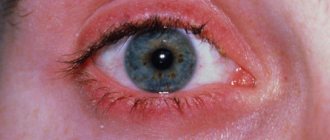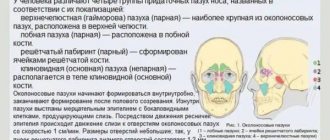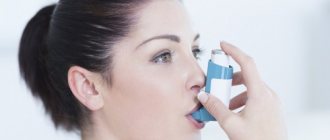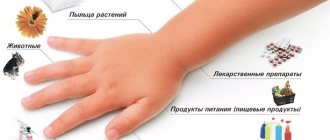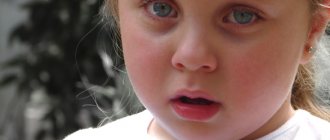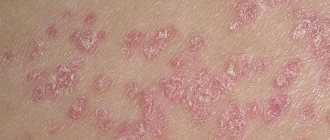Allergy cough is one of the types of protective reactions of the respiratory system to external and internal irritants. External ones include mold spores, pollen from flowers and fruit trees, pet hair, dust, down and bird feathers. Internal provocateurs of an allergic cough are food products that are not fully absorbed by the patient’s digestive system. As a result, allergens accumulate in the blood, which, upon reaching a certain concentration, provoke various allergic reactions. In some people, they manifest themselves in the form of rashes on the skin of the abdomen, chest, neck, cheeks, while in others, extensive bronchial spasm immediately occurs, the consequence of which is a severe dry cough.
Signs of an allergic cough - how to determine?
An allergic cough is very different from that observed in people suffering from inflammatory processes of infectious or viral origin. First of all, primary symptoms of the behavior of the respiratory organs are always observed a few seconds before the onset of a coughing attack. Among the main signs of an allergic cough are the following, namely:
- A dry cough begins immediately after contact with a potential allergen. In this case, it is very important to notice what exactly causes an attack of suffocation. If these are certain food products, then they need to be excluded from the diet and the patient’s further health status must be monitored. In case of a painful reaction to dust, pollen, bird hair and fluff, these irritants must also be removed.
- Before the cough begins, the larynx begins to itch. This is the most striking sign of bronchial spasm of allergic origin. Its presence indicates that the mucous membrane of the respiratory system is irritated to the limit. Immediately after the onset of this symptom, the patient feels like coughing. The attack becomes so strong that it is sometimes difficult to inhale another portion of air.
- Suffocation. This is another sign of an allergic cough. Before a bronchial spasm begins, the patient feels that his lungs seem to have decreased in volume. He tries to breathe in a full chest of oxygen, but he fails to do so. This pathological condition is followed by a dry cough, which can only be relieved with the help of bronchodilators or vasodilators.
- No mucus. With an allergic cough, there is almost never an outflow of sputum. This is justified by the fact that the inflammatory process in the lungs and bronchial tree is completely absent and mucus does not accumulate in it. The pathological condition of the respiratory system itself occurs only due to the fact that, under the influence of allergens, the walls of the bronchi suddenly contract, preventing air from entering the alveolar space, and then directly into the blood.
These are the main signs of an allergic cough, which were recorded in most patients with a similar pulmonary disease. Of course, one should never discount the individual characteristics of each individual organism. It is quite possible that in other patients the symptoms of allergic cough will manifest themselves slightly differently, or the clinical picture of the disease will be more blurred. In any case, the diagnosis of allergy is not made solely on the basis of the characteristic symptoms of bronchial spasm, and the final answer can only be given by an analysis of the body’s susceptibility to allergens. For this purpose, special tests are performed on the patient.
Why can an allergic cough occur and what is the mechanism of its development?
Before answering the questions posed, it should be noted that allergies are not a disease at all. This is just a reaction of our immune system to completely harmless components that are perceived by it as a threat.
The immune response to irritants, manifested in the form of cough, is noted both in childhood and in adults. This symptom is closely related to the development of inflammation in the bronchi and laryngeal mucosa.
The appearance of a cough of allergic origin is caused by the penetration of an irritant into the cilia of the bronchial tree, after which specific cells are irritated. As a result, the bronchi attempt to eliminate components that are “dangerous” to the body.
As a rule, allergies manifest themselves after exposure to irritating substances in the air flow.
The immune system reacts with a cough to the following allergens:
- Dust;
- Pollen;
- Pet hair;
- Nutritional supplements;
- Substances included in household chemicals;
- Tobacco smoke;
- Medicines (antibiotics).
Often an allergic reaction is observed in those people who pay great attention to hygiene.
If you live in too sterile conditions, then the functions of the immune system begin to gradually weaken, because they have nothing to fight with. As a result, the body turns on a response to even the most harmless components, which are perceived by it as danger.
This mainly concerns children who in childhood were fanatically protected from viruses and infections. This explains such a percentage of the incidence of bronchial asthma in childhood.
Treatment of cough from allergies in adults
Treatment of allergic reactions in adult patients requires a comprehensive and thorough approach.
For each such patient, an individual course of treatment is formed, which includes tablets, injections and syrups. Let's take a closer look at drugs of all categories, namely:
What to take from tablets
The modern pharmaceutical industry offers a huge number of antihistamine drugs in tablet form. The most effective way to relieve an attack of bronchial spasm of an allergic nature are tablets such as: Ketotifen, Eufillin, Aleron, Eden, Suprastin, Nosh-pa, Suprastinol. Some of them are medications whose pharmacological purpose is to block the negative effect of the allergen on respiratory receptors. Others perform the function of expanding the walls of the bronchial space and preventing their spasm. In most cases, drugs in these categories are used in combination to achieve maximum therapeutic effect.
Folk remedies
As a folk remedy for allergies, you can use a decoction of coltsfoot leaves for internal use. To do this, you need to take 30 grams of dried leaves of this medicinal plant, fill it with 1 liter of cold water and boil over medium heat for 20 minutes. The lid of the metal container must be closed so that all the essential oils contained in the medicinal herb remain in the decoction. After preparing the homemade medicine for allergic cough, it is still infused for 2 hours. As soon as the decoction of coltsfoot leaves has cooled, it can be consumed orally immediately.
To ensure that attacks of allergic cough do not reduce the quality of life of an adult patient, 150 grams of this decoction should be taken 3 times a day, 15 minutes before meals. It is very important to take the medicine at the same time. Then the maximum therapeutic effect will be achieved and patients even with the most severe forms of allergic bronchospasm will feel relief.
The first positive result is observed already 3-5 days from the start of treatment. The patient’s frequency of coughing decreases, breathing becomes clearer, and a larger volume of oxygen enters the blood, which undoubtedly affects the performance of the brain and the general condition of the body. Adults are allowed to undergo treatment for allergic cough with a decoction of coltsfoot for 10-20 days. It all depends on the severity and severity of bronchial spasm.
Herbal infusion against allergic cough attacks
Based on plants, you can prepare an effective remedy that will help cope with the main symptom of allergies - a painful cough. The only caution before using the medicine is to consult your doctor and ask permission to use the homemade composition.
Preparation:
- Grind 20 gr. oregano, coltsfoot, licorice (root).
- Place the prepared raw materials in a thermos.
- Boil water (about 350 ml), brew herbal paste.
- Close the thermos tightly and leave for two hours, this is enough to get a concentrated decoction.
- Perform filtering.
To quickly get rid of disturbing and debilitating symptoms, take the composition in small portions - only 15-20 ml. It is not recommended to try to improve the taste by adding sugar or bee product - this can not only reduce the effect of the medicine several times, but also cause additional complications. You can take the composition no more than five times a day. After coughing attacks lose intensity, you can reduce the number of doses.
Is it possible to independently identify an allergic cough in a child, the symptoms and treatment of this alarming manifestation - it is better for parents not to try to independently look for answers to these important questions. Only with the help of a specialist can you recognize an unpleasant disease, eliminate the irritant, and apply the most effective medications.
How to treat children with syrups?
In order to relieve a child from attacks of dry allergic cough, you can use antihistamine syrups. The following medications of this pharmacological group are best suited for children, namely:
- Loratadine;
- Cetirizine;
- Demetinden;
- Astemizole;
- Terfenadine;
- Clemastine;
- Fexofenadine.
These syrups are taken according to the instructions that come with each medicine. As a rule, treatment of allergic cough in children with the help of syrups involves taking the drug 2-3 times a day, 1-2 tablespoons of the medicine. The dosage is selected individually by the attending physician, a pulmonologist or an allergist. It is imperative that the specialist has experience treating pediatric patients. The duration of one therapeutic course is 8-12 days. It is very important that the treatment of an allergic cough in a child is based not only on regular intake of syrup, but also on limiting the consumption of potentially allergic foods.
Do I need to see a doctor and which one?
When symptoms of allergic bronchial spasm appear, contacting a specialized specialist is a priority. The patient needs to visit a pulmonologist or allergist. Ignoring this warning entails the transition of an allergic cough to a more complicated form, which is bronchial asthma. In fact, this is already a chronic lung disease, which is characterized by periodic attacks of suffocation.
The transition of an allergic cough to this stage threatens the patient with complete dependence on bronchodilator and antispasmodic drugs, produced in the form of tablets, intravenous and intramuscular injections, and also as aerosol inhalers. Seeing a doctor in a timely manner will allow you to avoid these negative consequences and promptly eliminate the manifestation of an allergic reaction in the form of a severe dry cough. Moreover, if this symptom was identified in a child whose respiratory system organs are just beginning to form.
yadishu.com
What is an allergy cough like?
The treatment of an allergic cough is fundamentally different from the treatment of a cold. Therefore, it is very important to learn to recognize it so as not to aggravate the situation and harm the body.
So, an allergy cough is dry (rarely wet). Has a paroxysmal character.
Almost always an allergy cough is accompanied by:
- Sore and itchy throat;
- Nasal congestion;
- Tearing;
- Redness of the sclera of the organs of vision;
- Sneezing;
- Clear nasal discharge.
The symptom appears suddenly and disappears in the same way. A coughing attack can last about 3 minutes, sometimes longer.
Antihistamines
To get rid of various signs of allergic manifestations, including cough, medications with antihistamine action are prescribed:
Fenkarol
The active ingredient of the drug is quifenadine hydrochloride. This remedy can be prescribed not only to eliminate symptoms, but also for preventive purposes.
It has an antipruritic effect, relieves allergic inflammation of tissues. Does not have a negative effect on the central nervous system. Side effects include drowsiness, dry mouth, and less commonly nausea.
Not prescribed for pregnant and lactating women, children under 3 years of age, as well as for those with a lack of sucrose, fructose intolerance, glucose/galactose malabsorption. There are no drugs containing the same active ingredient.
Suprastin
This is the most famous cure for allergic cough and other symptoms of this pathological condition. The active component of the drug is chloropyramine. This remedy is recommended for use at the first signs of an allergy.
It is available in tablet form, but for acute allergic attacks it is used in the form of ampoules for injection. It can be prescribed for any type of allergic reaction, no matter what the irritant is.
A special feature of the medicine is that it can be used to treat infants from birth. But during pregnancy, although it is prescribed, it is done with some precautions.
Analogues include drugs such as Chloropyramine and Chloropyramine hydrochloride.
Diazolin
Another effective and inexpensive remedy that has a sedative effect. The active substance of Diazolin is mebhydrolin, which helps eliminate rashes, itching, swelling, cough and other signs of food allergies. It somewhat reduces the reaction, so it is not recommended for use while working in hazardous industries or while driving.
Contraindications include gastrointestinal diseases, glaucoma, epileptic seizures, heart rhythm disturbances, pregnancy and breastfeeding.
Among similar products you can only find Diazolin for children (recommended from 2 years old, available in the form of granules for preparing a suspension) and Diazolin from Darnitsa.
Pipolfen
This drug, a phenothiazine derivative, is included in the treatment of allergic reactions and asthma attacks. It is an active antihistamine that affects the activity of the central nervous system.
It has a pronounced sedative, hypnotic, antiemetic, antipsychotic and hypothermic effect. Prevents the occurrence of urticaria and itching.
Manufacturers produce Pipolfen in tablet and injection forms. Disadvantages include the likelihood of nightmares, tinnitus, and decreased blood pressure. But despite such side effects, it is prescribed to relieve allergy symptoms in children from 2 years of age.
Not recommended for long-term use, as it may adversely affect liver function.
Similar drugs include the following medications: Diprazine, Promethazine for children, Promethazine hydrochloride.
Tavegil
A synthetic antihistamine that has a powerful effect against allergy symptoms, the active ingredient of which is clemastine.
To treat allergic cough in adults, you can purchase the drug in a variety of forms: rectal suppositories, tablets, solutions. There is also an aerosol and ointment for external use. The product can be used for children from 6 years of age; in this case, Tavegil syrup is better suited.
The medicine begins to act 30 minutes after administration; among the negative qualities, a negative effect on kidney function can be noted. Not prescribed for pregnant women and during the lactation period.
Complete analogues of Tavegil are Rivtagil and Clemastine.
Ketotifen
The active substance is ketotifen fumarate. Like other similar drugs for allergic cough, it has a positive effect on mast cells, preventing the release of histamines and the development of bronchial spasm. A noticeable result occurs on average 60 minutes after taking the product.
Contraindicated during pregnancy and lactation; also, according to the instructions, not suitable for use in children under 3 years of age. But, given the small number of side effects, it can be prescribed to eliminate signs of allergies at an earlier age, but this is only on the recommendation of a doctor. For children, you can buy Ketotifen syrup.
If we talk about structural analogues, then these include medications such as Staffen. Zaditen, Ketof, Frenasma, Pozitan.
Tsetrin
Another medication that can cure coughs of allergic origin. This is a selective drug that is popular because it does not affect the functions of the central nervous system. And at the same time, it effectively eliminates allergy symptoms without a sedative or depressing effect.
It is also used to treat allergies in children, in the form of tablets from the age of 6, syrup is prescribed by a doctor from the age of 2. A noticeable effect from taking Cetrin occurs within 20 minutes and lasts for 24 hours.
Fenistil
This allergy medicine belongs to the first, non-selective generation and has a moderate sedative effect. Eliminates the traditional set of allergic manifestations: skin itching, allergic runny nose and cough.
You can purchase the drug in the form of drops and tablets for internal use and gel for external use. Can be used for infants, according to the instructions, from 1 month, and according to indications with the approval of a doctor, even earlier.
The disadvantages of Fenistil include the fact that it eliminates only the symptoms without affecting the cause of the allergy - the irritant.
This product has only one structural analogue - Vectavir.
Erius
A drug whose active ingredient is desloratadine, which relieves signs of allergies, but does not affect brain function, that is, it does not dull attention or slow down the reaction.
In childhood, Erius syrup is prescribed, and in adult patients in the form of tablets. The first effect is observed 30 minutes after administration, the effectiveness remains throughout the day.
A course of the drug can be prescribed only if the allergy manifests itself in acute form. Side effects include attacks of dizziness, impaired bowel movements, lethargy, and increased fatigue.
Analogue drugs include drugs such as Dezal, Ezlor, Lordestin, Desloratadine, Elisea, Nalorius.
Zyrtec
This antihistamine belongs to the second generation of drugs. It is used for preventive purposes, eliminates acute symptoms, thereby easing the course of the disease. Improves coughing, reduces swelling and hyperemia.
It is recommended for children from 12 months of age in the form of drops, and from 6 years old they can already be given tablets, but of course under the supervision of a specialist. The maximum effectiveness of the medicine appears in the evening, so it is best to take it before bed.
Structural analogues containing, like Zyrtec, cetirizine hydrochoride as an active component, are the following drugs: Zodak, Alerza, Cetirizine Hydrochloride, Tsarlazin, Zintset, etc.
But in addition to medications, you can successfully use folk remedies for allergic cough.
kashelb.ru
What drugs fight allergic cough?
To the question of what to take for an allergic cough, do doctors have a clear answer? If eliminating the allergen is impossible, the doctor will prescribe antihistamines that will relieve allergy symptoms and alleviate the patient’s condition. This group includes several generations of drugs that reduce the level of histamine in the body.
I often use traditional allergy pills - Tavegil and Suprastin. However, they have many unwanted effects and cause daytime drowsiness. Therefore, their use, especially for working people, is not always advisable.
Thus, the drug Zyrtec, Claritin, Zodak, Cetrin are new generation drugs that practically do not cause side effects. Can be used by children from 2 years of age.
As for those who are younger, in this case the medicine Fenistil is recommended. It can be used from the first month of life. All these remedies effectively combat allergy symptoms and quickly eliminate a coughing attack.
For rhinitis, doctors recommend using vasoconstrictor drugs that will relieve swelling from the nasal mucosa and make breathing easier (Noxprey, Naphthyzin). In this case, rinsing the nasal cavity with saline solutions will also help.
Attacks of suffocation are well eliminated by glucorticoid drugs. However, their use is possible only after consultation with a doctor (Berodual, Pulmicort).
Adsorbents are often prescribed to treat coughs of allergic origin. These drugs absorb toxins in the gastrointestinal tract and remove them in the urine.
The most popular are:
- Atoxyl;
- Enterosgel;
- Polysorb;
- White coal;
- Smecta.
In especially severe cases, when there is an allergy to several irritants, hardware methods of purifying the blood from allergens - immunosorption and hemosorption - can stop it. The essence of the procedures is that the patient’s blood is passed through sorbents, purified and returned to the bloodstream.
How else to treat allergic cough? Quite often, the doctor prescribes the technique of gravitational blood surgery - lymphocytopheresis and plasmapheresis. During these manipulations, the liquid component of the patient's blood plasma is removed, which, as a rule, contains allergens.
Bronchodilators can also help cure coughs caused by allergies. These medications will help with severe swelling of the airways. To relax the smooth muscles of the bronchi and eliminate bronchospasm, use Eufillin, Beclomethasone, Salbutamol .
Many of the drugs with a bronchodilator effect are available in the form of inhalers. These products should be used only according to strict indications.
An excessively obsessive cough due to allergies, as a rule, manifests itself due to the accumulation of too thick mucus in the bronchi.
To liquefy it and facilitate its removal from the respiratory organs, you should take:
- Ambroxol;
- Bromhexine;
- Lazolvan.
A cough suppressant is prescribed in the form of inhalations or tablets.
Pharmacy drugs
Treatment of allergic cough is long-term. In some cases, the course lasts several weeks or months. But sometimes it is necessary to take medications for many years or for life. In this case, the doctor’s prescriptions may change several times depending on the situation.
If you want to take anti-allergy pills on your own, do not forget to consult a specialist. After all, in order to understand which drugs will treat you most effectively, you need to determine what you are allergic to.
Pills
- "Suprastin". The most popular tablets for allergic cough. It is advisable to take it only if you suspect an allergic reaction. It is prescribed for almost all types of allergies in adults, without specifying the irritant. Since the medicine has no side effects, it can be used even for newborns. But pregnant women are advised to exercise caution during treatment.
- "Tavegil". A very powerful antihistamine for adults. The course of treatment is 7 days. Relief occurs within 30 minutes after administration. The drug has a small number of contraindications. In addition, it adversely affects the kidneys. For children it can only be used from 6 years of age. Pregnant and lactating women are strictly prohibited from treating with Tavegil.
- "Fenkarol". This medicine can not only treat allergic cough, but also prevent its occurrence. In addition, it eliminates skin itching and reduces the intensity of the development of the inflammatory process. Does not affect the nervous system. As for side effects, there are few. In rare cases, a feeling of dry mouth and drowsiness may occur, and even more rarely, nausea may occur. Pregnant women and those who are breastfeeding are not recommended to take this remedy.
- Telfast. This remedy represents a new generation of antihistamines. It effectively fights the cause of cough - the causative agent of allergies. The drug has very few contraindications, but children can still take it no earlier than 6 years of age. In addition, it has no addictive effect. This is a big plus. Among the side effects, only drowsiness and slight dizziness were noticed. Relief occurs approximately an hour after taking the tablet. However, you cannot take this drug at the same time with medications containing calcium or magnesium. In this case, the effectiveness of treatment decreases. .
- Zyrtec. Antiallergic drug belonging to the second generation. It is most often prescribed for adults for preventive purposes. In addition, it brings significant relief, eliminates cough, relieves skin redness and swelling. Children can only be treated with it from the age of 6 years. The only downside of the medicine is that large capsules are sometimes difficult to swallow, and you cannot bite them. This remedy has maximum effect if taken before going to bed.
Syrups
- "Zodak". This syrup is prescribed for allergic coughs in both adults and children. The latter can be taken only from 1 year. Elderly people are advised to exercise caution when taking it. Zodak syrup is very easy to use and retains its healing effect throughout the day. If any kidney disease is diagnosed, the standard dosage should be reduced. Side effects include abdominal pain and slight dizziness.
- "Claritin." A product with selective action. Prescribed for both adults and children. This syrup effectively eliminates allergic cough and prevents relapses. The drug affects only those cellular structures that take part in the development of the allergic reaction. At the same time, the syrup has no side effects. The effect appears approximately 30 minutes after consumption and lasts throughout the day. The active substances of Claritin do not penetrate the blood-brain barrier. Thus, the syrup does not affect the central nervous system.
- "Lomilan." An excellent syrup that copes well with allergic coughs and other symptoms of seasonal allergies. It does not have any contraindications. The exception is excessive sensitivity to the components of Lomilan and pregnancy. This syrup may affect alertness and reaction speed. Children are allowed from 2 years of age. Side effects include headache, drowsiness, sleep disturbances, nausea and liver disorders.
Aerosols
- "Intal". This drug affects the mucous membrane and prevents the release of mediator substances from the respiratory tract. It is advisable to use it in courses. It is not suitable for symptomatic treatment, since it will not relieve an acute attack of cough. It should be borne in mind that after administration there is a risk of bronchospasm. You can remove it by immediately drinking a glass of water. Children can use from 5 years of age. Allowed for pregnant women. Caution when taking should be observed for those who have been diagnosed with liver and kidney failure.
- "Alcedine." This drug effectively eliminates allergic cough. Can be used for children from 6 years of age. It has almost no contraindications. True, pregnant women need to use it extremely carefully. It also has an anti-inflammatory effect and a low level of absorption. If any systemic infections or tuberculosis have been diagnosed or surgery has been performed, Alcedin is strictly prohibited.
- "Tailed." This remedy is able to block cough and inflammation and stabilize the functioning of the cell membrane. It is an analogue of Intal, but is 4 times more effective. Significantly reduces the frequency of coughing and choking attacks, and also improves breathing. The drug is safe, so it can be used for children from 2 years of age. The course of application is designed for a 6-week period. Every day you need to do up to 8 inhalations, but no more.
- "Klenil." Local action medication. Prescribed for the treatment of bronchial asthma. The product actively fights cough and inflammation. As for side effects, people experienced hoarseness, headache, and increased eye pressure. The inhaler must be used constantly, and not only when you need to relieve a symptom that has appeared - to eliminate a cough. The obvious effect is noticeable after 7 days of regular use. It is not recommended to treat children under 4 years of age.
Tablets for allergic cough: descriptions of the best drugs and how to take them
One of the manifestations of allergic reactions is coughing. For its treatment, it is important to promptly identify the allergic nature of cough attacks.
The best way to completely get rid of the syndrome is to eliminate the allergen. Medicines and folk remedies help alleviate the patient’s condition.
For allergic cough, antihistamine tablets are prescribed, which suppress attacks and other manifestations of the disease.
Signs of allergic cough in adults
Cough is present in many diseases; only a doctor can find out its causes. Allergic cough has a number of distinctive features:
- the attack starts suddenly - a short time after contact with the allergen;
- if the allergen is constantly present, only antihistamines can stop the cough; other medications do not help;
- there are no signs of a cold - fever, malaise, sore throat;
- the cough is dry, with debilitating attacks, in rare cases there is a small amount of clear, thin sputum;
- Other signs of allergies are often present - watery eyes, sneezing, nasal discharge, skin rashes, itching and sore throat.
Allergic cough has a definite time frame, which is determined by the appearance and exposure of the allergen. If the pathogen is of natural origin (frost, plant pollen), the seasonality of exacerbations is clearly visible. When the allergen disappears, coughing attacks stop, and the patient's condition improves naturally.
What can cause
The number of people suffering from allergic cough is constantly growing, and the number of causative agents of reactions is also increasing. Let us highlight the most common causes of allergies with cough manifestations.
Warm or cold
In addition to skin manifestations in the form of a rash, changes in the color of the epidermis, itching, allergies to cold or heat can be expressed in coughing attacks.
Certain Products
If you are allergic to foods, you may also experience a cough. Both synthetic additives in food and natural ingredients (much less often) pose a danger.
Chemical substances
Household chemicals and cosmetics are among the leaders in the number of allergic reactions caused. Many people suffer from contact with detergents and air fresheners.
Pets
The fur of cats, dogs, and bird feathers contain allergens that can cause coughing. Aquarium inhabitants and small rodents can be dangerous.
Household mold or pollen
Flowering plants cause seasonal bursts of allergic cough, which themselves disappear with the onset of the cold season. Household mold and dust are constantly present around people. It is especially difficult to combat such allergy pathogens.
Effective drugs in tablets
Allergy medications are called antihistamines. Three generations of products have already been created, differing in duration and nature of action. The latest generation of drugs are free from the disadvantages of earlier drugs - they do not have a depressant effect on the central nervous system, the effect lasts a long time, and addiction does not develop.
Let's look at the most prescribed drugs of different generations that help relieve coughs due to allergies.
Telfast
Refers to drugs with a small number of contraindications and side effects. A weak sedative effect is possible only with long-term use. Telfast suppresses the production of histamine and prevents the development of allergic reactions. Admission is allowed from 6 years old. If the dosages are observed, addiction does not occur.
Trexil
A third generation drug for the relief of acute attacks of allergies to medications, food, and other substances. Used for asthma. The effect of Trexil lasts up to 12 hours. It has virtually no contraindications or side effects in the form of central nervous system depression.
Note: if taken uncontrolled and in excess of dosage, any allergy drug can cause adverse reactions in the form of skin rashes, fatigue, nausea, decreased attention and drowsiness.
Application of syrups
With severe coughing attacks and throat irritation, it is often difficult to take a pill, especially for children. In childhood, it is better to use syrups that have a pleasant taste and smell.
They are quickly absorbed by the mucous membranes and have a pronounced antitussive effect.
Lomilan
The action of the homogeneous suspension begins 30 minutes after administration and lasts up to a day. Lomilan has an antiallergic effect and is used to treat seasonal allergies. Loratadine in the composition blocks the action of histamine and eliminates cough syndrome. The drug is used for systemic use and relief of seasonal exacerbations, starting from 2 years.
Claritin
The antiallergic drug has a quick and long-lasting effect (up to a day). In addition to cough, it eliminates itching and sore throat. The use of syrup is permitted from 2 years of age. Dosage is calculated by weight. Claritin has no effect on the nervous system and has good absorption rates by the gastrointestinal mucosa.
Zodak
The drug is approved for use in children from one year of age. The active component cetirizine is a second generation antihistamine.
Zodak eliminates primary and late allergic manifestations, reduces the production of exudate, and reduces itching. Ceterizine prevents the accumulation of fluid in the tissues of the respiratory system and the formation of edema.
Does not cause drowsiness, as it does not have a sedative effect.
Alternative remedies
An alternative to cough tablets can be considered preparations in the form of sprays. When a finely dispersed substance is sprayed, the particles enter the bronchi directly during breathing, acting quickly and effectively. Aerosols deliver the active substance in dosed portions, which helps suppress cough syndrome.
Sprays quickly eliminate swelling of the larynx and nasopharynx, facilitating the passage of oxygen into the bronchi and restoring respiratory functions.
Alcedin
The drug is one of the drugs used in the treatment of bronchial asthma. Release form: spray for nasal and inhalation use. It contains a glucocorticosteroid, which provides antiallergic and anti-inflammatory effects. With regular use, Alcedin reduces the likelihood of developing coughing attacks, but does not relieve bronchospasm.
Klenil
Inhalation product in aerosol packaging. The active substance is the glucocorticosteroid beclomethasone dipropionate. Recommended for regular use, which dramatically reduces the frequency of coughing attacks. Used to treat asthma and allergies with severe dry cough. Reduces the need to use bronchodilators.
Intal
To relieve bronchospasms, the drug cromoglycic acid, which is an antiallergic agent, is used. Instal is produced in the form of capsules with powder, aerosol and liquid for inhalation.
It is used to relieve cough attacks (lasts up to 5 hours), but the drug gives the best effect when taken continuously, preventing the development of the syndrome.
Tailed
Available in aerosol form for inhalation use. Tailed is used for asthma; the drug reduces the severity of night attacks. Used for allergies to air components that act upon inhalation. Tailed relieves inflammation of the mucous membranes and reduces the need to take bronchodilators.
ethnoscience
In the absence of tablets, allergic cough can be overcome with folk remedies. Infusions and decoctions reduce attacks, soften mucous membranes, alleviate the general condition, and stabilize the nervous system.
Chamomile decoction
Chamomile decoction helps relieve cough. To prepare you will need:
- chamomile flowers - 2 tablespoons;
- water – 0.5 liters;
- honey - a tablespoon.
The flowers are poured with boiling water and kept at a low boil for 1-2 minutes (you can pour boiling water in a thermos). Leave for 20-30 minutes. When it cools down, add honey. Take ½ glass after meals.
Honey and garlic syrup
This composition has antiseptic, anti-inflammatory and antitussive effects. The head of garlic is crushed and poured with liquid honey. Keep in a dark place for 2 weeks. Take a tablespoon during a cough attack or prophylactically 3 times a day.
Ginger
The antitussive properties of ginger are used in several ways:
- inhalation - grated fresh root or powder is added to the inhalation solution;
- tea - add dry or fresh ginger, milk, honey, lemon to hot water;
- infusion - pieces of the root are poured with water and left for 10 minutes.
The urge to cough goes away if you chew a piece of fresh ginger.
How to choose the right medicine
Allergies are treated by an immunologist-allergist. Timely treatment will help you choose treatment tactics and an effective drug. If it is seasonal, it is important to start a course of antihistamines on time so as not to provoke an exacerbation. It is important to adhere to certain rules:
- the course of treatment is completed, even if there are no attacks of dry cough;
- if a dose is missed, take the pill as soon as possible;
- To relieve a severe coughing attack, you can use a spray that has a quick effect.
If a patient suffers from episodic coughing attacks due to accidental contact with an allergen, it is important to have a drug with you that can have a quick effect. Allergy only seems to be a harmless disease; with severe sensitization, suffocation, swelling of the larynx and bronchi with blockage of the airways can develop.
When selecting medications, the doctor takes into account concomitant diseases, possible negative effects, and the nature of the patient’s work and life.
Important: in case of allergic cough, identifying the allergen and eliminating it from life eliminates debilitating attacks. The causative agent of cough syndrome can be determined using tests.
An allergy sufferer should avoid contact with hazardous substances, carry out prevention using prescribed medications, strengthen the immune system, which will help reduce the production and effect of histamine on the body. Modern safe medications can keep allergies under control.
Dima
Source: https://VipLor.ru/kashel/allergicheskij-tabletki
Indications for the use of allergic cough tablets
Allergic cough is not treated with conventional cold medications. This is not surprising, because allergies are not a cold, although their symptoms are similar. This cough can occur when any allergen or foreign particles enter the respiratory tract. The cause of illness is the body’s immune reaction to certain external stimuli.
An allergic cough can be of several types - dry, wet, barking, suffocating. But cough may not be the only symptom. As a rule, it is accompanied by sneezing, runny nose, shortness of breath, and difficulty breathing. Symptoms of such a cough occur after contact with an allergen, although sometimes not immediately, but after several hours and may not stop for several days.
Symptoms may appear immediately after contact with the allergen or after several hours. The most effective option is to eliminate contact of the allergen with the body, but this is not always possible. A somewhat less effective, but still working method is to take special allergic cough tablets.
Types of antiallergic drugs
In modern medicine, there are quite a lot of drugs that can help with allergies, they all act a little differently, although they perform the same task. Therefore, only a specialist can prescribe the best allergic cough tablets for each specific patient.
Medicines are divided into types depending on their mode of action. The following types of drugs are distinguished:
- antihistamines (block the action of histamine, which is produced by the body as a reaction to an allergen and causes unpleasant symptoms);
- mucolytics (turn a dry cough into a wet one, thinning sputum and causing mucus to leave the body faster);
- antitussive and anti-inflammatory drugs (relieve inflammation of the mucous membranes, and can also stop coughing attacks).
In addition, tablets for allergic cough in adults are divided into three generations.
First-generation drugs act immediately after administration and also quickly leave the body, so their effect is very short-lived; in addition, such drugs have many side effects and can be addictive.
However, they have a long history of use and are well studied. Some of them can be given to infants. And it is this type of medication that copes well with acute attacks of allergies to food, medications, insect bites and more.
Second-generation medications last longer (up to 24 hours), after taking them they do not make you sleepy, addiction cannot occur, and there are fewer side effects.
But such drugs must be taken in a course once a day and you should not expect an instant effect.
People with heart disease should be very careful when taking it, as second-generation drugs can cause a cardiotoxic effect.
Third generation drugs are the most effective and can even help relieve chronic allergies, as they can last longer than the season in which allergies appear. They do not cause sedation and do not reduce concentration.
Groups of drugs for allergic cough of the first generation
Such drugs are taken to quickly relieve unpleasant symptoms.
Diphenhydramine
Reduces cough and has an anesthetic effect. But at the same time it has sedative properties and also dries out the mucous membranes.
Groups of drugs for allergic cough of the second generation
They give a longer lasting effect, but are taken in a course.
Rupafin
Taken once a day, relieves allergic symptoms, the effect is achieved after 45 minutes. In some cases, the drug may interfere with kidney function.
Not suitable for pregnant women and children under 12 years of age.
Zritek
Relieves spasms, redness, swelling. Large capsules are taken before bed.
Can be given to children over 6 years old.
Loratadine
Antihistamine. Relieves allergic symptoms without causing sedation.
Loratadine is an antihistamine
Can be taken with alcohol.
Groups of drugs for allergic cough of the third generation
The newest drugs are often used for chronic allergies.
Gismanal
Relieves spasms, reduces exposure to allergens. The effect becomes noticeable an hour after administration, the maximum concentration in the body occurs after 8 – 10 days. The effect lasts as long as you take the drug.
It should not be taken by pregnant women, lactating women, children under two years of age and people with liver disease.
Traditional medicine
Nature also makes its contribution to the treatment of coughs of allergic origin. She offers many different medicinal herbs, berries, flowers, fruits and vegetables that help in eliminating this symptom.
There are so-called folk recipes. Let's list a few of them.
- Drink decoctions of plants that contain azulene. They cope well with coughs of an allergic nature. Among such plants are eucalyptus, geranium, yarrow, St. John's wort and chamomile. In addition, you can use decoctions of viburnum, string and nettle.
- A good option is potato inhalation. To prepare it, you will need to peel several potatoes and boil the peelings. Add thyme herb and eucalyptus leaves to the boiled peelings. Simmer it all over low heat for 5 minutes. Add a drop of fir essential oil to the potion. Now you can begin the procedure. The duration of such inhalation should not exceed 10 minutes.
- If you have already started coughing, thoroughly rub camphor oil into your chest. Then place mustard plasters pre-soaked with warm water there. The duration of the procedure should not exceed 20 minutes.
- An excellent helper is lemon with the addition of natural honey. To prepare this medicine, finely chop the lemon, add a couple of tablespoons of honey and 4 tablespoons of drinking water. Mix all this well and cook over low heat until you get a homogeneous mass. The product should be taken chilled, 1 full tablespoon no more than 6 times a day.
After the fact
Today there are quite a lot of medicines that relieve and eliminate allergic cough. Traditionally, tablets are considered the easiest to take, relatively inexpensive and effective. However, as they say, the light did not converge on this form of release of the drug. Therefore, if desired, you can use syrup, aerosol or do inhalations according to “grandmother’s” recipes.
The most important thing is to choose the most suitable drugs after mandatory preliminary consultation with an experienced specialist.
In this case, there can be no talk of any self-medication (including folk methods). After all, an allergic cough can provoke the development of serious complications - even tragic consequences.
www.lorcabinet.com
The mechanism of cough due to allergies
The allergen, whatever it may be, “settles” in the throat, pharynx, trachea, bronchi, causing their irritation. Just as a skin rash causes itching and a desire to scratch, irritated mucous membranes of the respiratory tract provoke a cough - a kind of way to “cleanse” the surface of an irritating allergen.
In children, allergic cough is manifested by rare dry coughs, similar to colds. Adults are more likely to experience debilitating, gut-wrenching bouts of barking cough, which even doctors unfamiliar with the patient and his medical history can mistake for a sore throat or the flu. In both cases, the symptom occurs suddenly, indicating direct recent contact with the allergen.
If you suspect the development of an allergic reaction, carefully analyze the changes that have recently affected your lifestyle in everyday life. The causes of cough can be the following factors:
- moving to a new area with climatic conditions different from usual;
- changing the diet, introducing new products into it;
- the presence of pets nearby,
- use of down and feather pillows, wool or fur products;
- changing the brand of household chemicals, perfumes, decorative and skin care cosmetics;
- taking certain medications;
- carrying out repair work accompanied by a large amount of construction dust (replacing windows, working with a drill, hammer drill, chiselling walls, etc.).
Specific allergens that cause a reaction in the body can be determined using special tests prescribed by an allergist.
Main symptoms
We are talking about coughing as a key sign of an allergy. Therefore, it is worth considering the symptoms of an allergic type:
- duration (dry lasts for months);
- absence of accompanying body reactions that are characteristic of colds;
- clear mucus is released;
- exacerbation of attacks upon contact with an allergen;
- secondary manifestations of allergies are rhinitis, conjunctivitis, skin rashes with swelling.
Note! The allergic type occurs unexpectedly if a person feels healthy and is often not accompanied by additional interactions of the body.
Symptoms:
- the temperature does not rise;
- pain in the head area;
- increased lacrimation and redness of the eyes;
- copious, colorless discharge from the nose;
- sneezing several times in a row;
- sudden attacks;
- the symptom is barking and dry, appears more at night;
- itchy throat and nose;
- skin itching;
And unlike dry, wet allergic cough is characterized by the production of sputum. A healthy child can cough up to fifteen times a day, more often in the morning, clearing the larynx and other respiratory organs of microparticles. Excessive drooling during teething can also cause a wet appearance.
The most common causes of a wet cough in a child are:
- infectious diseases (acute viral infections);
- inflammatory disease of the bronchi, in which the airway is obstructed;
- pneumonia in remission;
- asthma and allergies;
- rhinitis, including allergic;
- an abscess localized inside the lung tissue;
- tuberculosis.
Important! Allergic must be distinguished from bronchitis or whooping cough. All diseases are treated differently. You cannot treat a child on your own, without consulting a professional, since the choice of medications should be made exclusively by the doctor.
How to distinguish an allergic cough from a cold
Suspicion of an allergy is confirmed if the following symptoms are present:
- dry cough lasts more than 3 weeks, worsening in the evening or at night;
- there are no symptoms of colds: fever, body aches, weakness, chills;
- there is no sputum discharge. Only in some cases is it possible to cough up colorless mucus from the lungs in small quantities;
- mild attacks of suffocation due to immediate swelling of the mucous membrane of the lungs and bronchi.
Often accompanying coughs with allergies are accompanying symptoms:
- the appearance of skin rashes, reddened areas of the body (dermatitis, eczema, urticaria);
- itching of the skin;
- "current" nose;
- watery eyes;
- signs of bronchial asthma (shortness of breath);
- Quincke's edema.
Features of allergic cough in children
The first signs of allergies begin to appear in children from 1.5 years of age.
Moreover, the manifestations of allergic cough in adults are much less dangerous than in children. Parents should be especially wary of seasonal exacerbations of coughing attacks in the spring-summer season - the first signal of the development of bronchial asthma.
To find out which allergens provoke the symptom, you need to seek a diagnosis from an allergist. The doctor will prescribe skin tests, which can be performed using several methods:
- prick test (liquid allergen is applied to the skin, after which the skin is pierced with a special needle to a certain depth);
- scarification method (drops of liquid with allergens are applied to the skin of the forearm, after which small incisions are made with a sterile instrument at the application sites);
- skin test (bandages with liquid allergen are fixed on the skin of the back);
- nasal or conjunctival tests (a safe amount of allergen is injected into the nasal passages or onto the mucous membrane of the eyes).
Treatment
The main step in treating an allergic cough should be to accurately identify and eliminate the allergen. Sometimes this is enough for not only the cough to disappear, but also other accompanying symptoms.
You should ruthlessly get rid of the feather pillow, duvet, indoor plants on the windowsill, and take away your pets (no matter how cruel it may sound, your four-legged pet will have to be given to another family).
Drug therapy
Antihistamines will help alleviate the patient's condition and relieve attacks of allergic cough. To date, four generations of drugs have been developed, the latest of which has a minimum of side effects.
- First generation drugs: Diphenhydramine, Tavegil; Suprastin (have a strong sedative effect, causing drowsiness, headache and lethargy; therefore, they are not recommended for use by persons whose activities require a quick reaction).
- Second generation drugs: Claritin, Cetirizine, Fenistil (they are not addictive, and the effect of use lasts 24 hours, so it is enough to take the drug once a day. Significantly fewer side effects for the nervous system compared to first generation drugs).
- Third generation drugs: Fexadin, Zodak, Dezal (metabolites that do not have side effects on the nervous and cardiovascular systems).
- Fourth generation drugs: Ebastine, Bamipin. (have the longest effect and do not affect the functioning of the cardiovascular system).
Only a doctor can prescribe a specific medication. He also calculates the dosage and application regimen. You should not violate them, as this will negatively affect the course of the disease and the timing of recovery.
Another effective type of medication for exacerbation of allergies is enterosorbents (Polysorb, Smecta, Polyphepan, Enterosgel, activated carbon, etc.).
The active substances of sorbents absorb and remove toxins from the gastrointestinal tract, promoting general cleansing of the body. A two-week course of treatment is enough to feel the positive effect.
In case of a severe allergic reaction, in addition to drug treatment, blood purification procedures - plasmapheresis and hemodialysis - may be prescribed.
If an allergic cough is a manifestation of bronchial asthma, an attack of coughing and suffocation can be relieved only with the help of inhaled glucocorticoids: Pulmicort, Berodual, Budesonide, etc. The listed drugs are hormonal, so only a doctor should prescribe their use.
Folk recipes
Folk methods and remedies will help you cope with dry allergic cough:
- Rinse your mouth and throat with plain warm water as often as possible to reduce the presence of the allergen on the mucous membranes;
- brew tea with herbs that contain azulene, which has an antiallergic effect (nettle, St. John's wort, eucalyptus, yarrow);
- Eat as many hypoallergenic foods high in calcium as possible.
Principles of treatment of cold cough
Infectious diseases that cause coughing are treated by a general practitioner. For this purpose, drugs are prescribed that:
- reduce the viscosity of sputum;
- improve its discharge;
- if the cough is severe, the use of drugs that suppress this reflex is indicated.
However, in order for the effect of therapy to be most pronounced, it is necessary not only to fight the symptom, but also to treat the cold, affecting the cause of the pathology. For this purpose, antiviral drugs are prescribed. Sometimes antibacterial drugs are added to them - this is necessary in cases where a bacterial infection is suspected of being associated with ARVI.
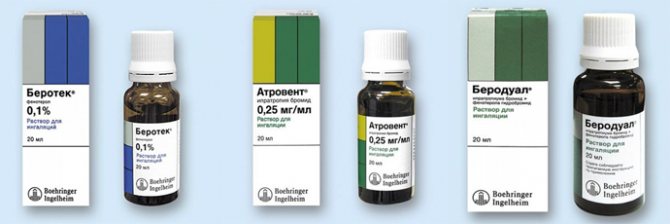
Prevention of allergic cough
Preventive measures against cough for allergies are measures that prevent its occurrence or exacerbation. Treating a disease is always more difficult than preventing it.
If specific allergens are known, they should be eliminated from life by all available means. For example, it is possible to prevent an exacerbation of hay fever (pollen allergy) by traveling to another area while the problem plants are blooming.
The following measures will also help prevent allergic cough:
- daily wet cleaning of premises;
- exclusion from the diet of foods that can provoke a cough attack (hot, spicy, bitter seasonings, aromatic additives, certain foods);
- clothing, bedding made of synthetic or natural fibers (without down, feathers, wool);
- absence of indoor plants and pets;
- the use of cabinet furniture with closing doors (without open shelves where dust accumulates, especially in bookcases), and soft corners and work chairs with upholstery made of natural or artificial leather, which can be wiped daily;
- the use of hypoallergenic household chemicals on a natural basis (the so-called “children’s series”);
- monitoring the body's reaction to new foods and medications with immediate refusal of them in the event of an allergic cough.



